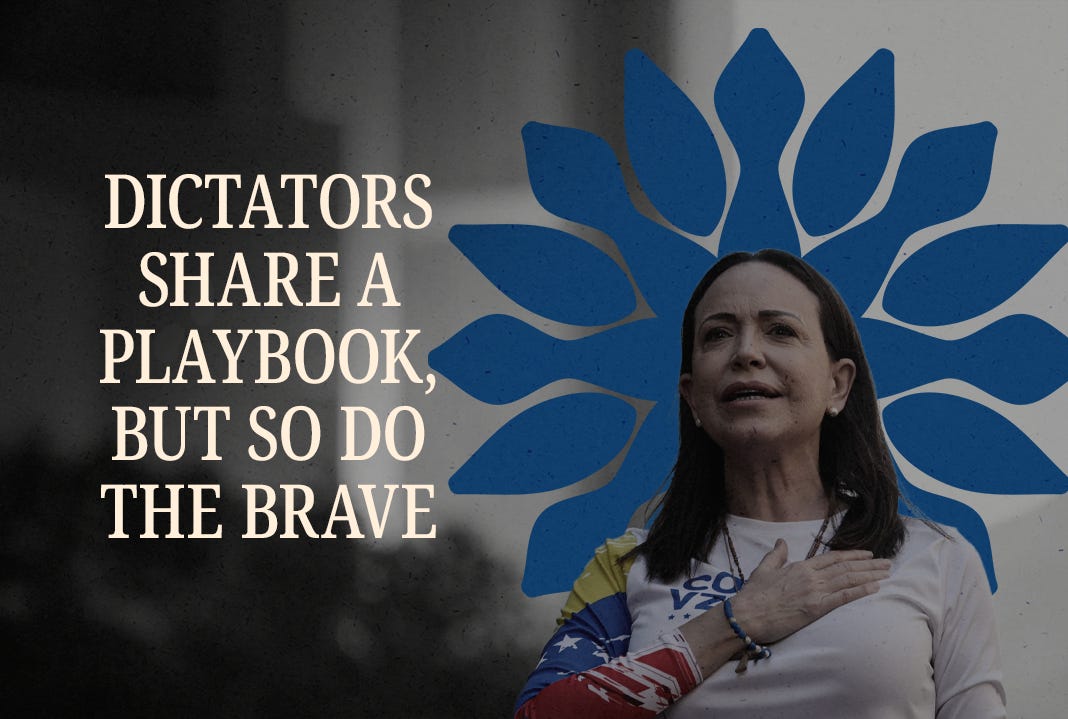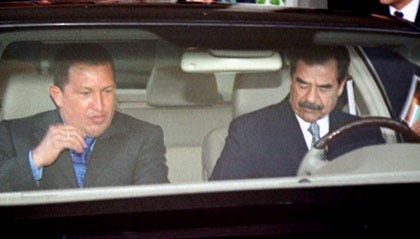Dictators Share a Playbook, But So Do the Brave
María Corina Machado’s fight for freedom in Venezuela reverberates across the Middle East, where reformers face the same repression and draw strength from the same resolve.
When Hugo Chávez visited Baghdad on August 10, 2000, schoolchildren were lined up along the roads, waving flags beneath a scorching sun for a man they had never heard of. Teachers told them he was a dear friend of Saddam Hussein and a revolutionary hero defying the West. The loudspeakers played songs of unity and resistance, but behind the noise, people understood what it really meant. It was a theatrical display of power, one dictator saluting another, creating the illusion of solidarity between men who had long confused control with justice.
Years later, when Venezuela descended into hunger, corruption, and exile under Chávez and Maduro, both Iraqis and Iranians recognized the pattern. They had seen this script play out at home. The leader who promises dignity becomes the oppressor. The party that claims to speak for the people becomes their jailer. The revolutions that promise justice for the poor often leave them paying the highest price.
And then, out of that suffocating darkness, came María Corina Machado.
Her voice carried the clarity of truth in a world addicted to lies. Many people in the Middle East came to know her name long before it appeared on the global stage. They spoke of her determination, her stoic resolve, and her refusal to surrender to despair. She had been banned, threatened, and attacked, yet she stayed to fight.
Machado once said, “Dictators share a playbook. So do we.” The statement is as prophetic as it is political. Every tyrant, whether in Caracas or Tehran, follows the same manual. They build networks of intimidation, dress repression in the language of nationalism, claim divine or historical legitimacy, and turn every institution into a mirror that reflects only their own image. But those who resist them also share a playbook, one driven by the refusal to abandon the truth and the will to be free.
In a 2011 Al Jazeera interview, Machado declared, “This is not about left or right. This is about freedom.” The Arab and Iranian worlds know this struggle all too well. Our societies have been divided into endless ideological trenches while the real conflict has always been between those who fear freedom, and those who are willing to live for it.
Machado’s stand reflects what Arab and Iranian reformers have known for generations: courage is contagious. “They want us to believe we are defeated,” she once said, “but we are not.” Those words could have been spoken by the women of Iran, tearing off their hijabs in defiance of the regime, or by the young Iraqis who carried their flag through tear gas and bullets during the Tishreen protests. In her story, they see their own reflection, the refusal to bow, the insistence on dignity even when the price is exile or death.
Her being awarded the Nobel Peace Prize is a message to every nation where tyranny has been normalized. It tells us that dictators may control television screens, but they cannot control the human spirit. That revolutions without values are not revolutions at all, only prisons with new guards.
When she speaks of Venezuela’s future, she could be speaking to every Arab and Iranian who dreams of a nation governed by fairness, reason, and human rights. “This is a fight for life,” she says, “for the right to live in truth.”
From the streets of Baghdad to the alleys of Tehran, from the ruins of Aleppo to the silence of Kabul, millions still utter that same truth, if only under their breath. They whisper it in secret because they know that words can be dangerous, but to say nothing is worse.
In Afghanistan, teachers now gather in hidden rooms to teach girls who are forbidden to learn. They risk their lives every day, running underground schools by candlelight. Some of these women were once public educators, others only mothers who could not bear to see their daughters’ futures stolen. When the Taliban closed the schools, they opened their homes. When the regime banned textbooks, they wrote lessons by hand. When the authorities raided classrooms, they started again in another village. These women know, as María Corina Machado does, that small acts of rebellion can help a nation reclaim its dignity.
One teacher was asked why she kept teaching despite the danger. She answered, “Because ignorance is the Taliban’s weapon. And I refuse to hand it to them.” That spirit reverberates across the region. It is the same spirit that drives Venezuelans to vote even when the ballots are rigged, Iranians to sing freedom songs in prison cells, and Iraqis to march with the flag of a country that still feels like a farce.
María Corina Machado’s courage gives these struggles a face and offers a reminder that freedom is not granted; it is built, often in secret, by people who refuse to forget what dignity feels like. Dictators fall not when their armies lose, but when people stop believing in their myths.
The Arab, Iranian, and Afghan worlds can learn from her that freedom begins the moment blind obedience ends, that truth can outlast terror, and that the smallest act of dissent can ripple across borders.
When Chávez visited Iraq, children waved flags for a man they were told was a hero. Today, from Baghdad to Kabul, many would rather raise a flag for a woman who stands unarmed yet unbroken, showing that courage outlasts cruelty, truth cuts through propaganda, and freedom once stirred is hard to contain.
Dictators may share a playbook, but so do the brave.
Middle East Uncovered is powered by Ideas Beyond Borders. The views expressed in Middle East Uncovered are those of the authors and do not necessarily reflect the views of Ideas Beyond Borders.





Excellent
"...They build networks of intimidation, dress repression in the language of nationalism, claim divine or historical legitimacy, and turn every institution into a mirror that reflects only their own image. "
"...dictators may control television screens, but they cannot control the human spirit."
"...ignorance is the Taliban's weapon. I refuse to hand it to them."
"...courage outlasts cruelty, truth cuts through propaganda, and freedom once stirred is hard to contain."
"Dictators may share a playbook, but so do the brave."
Yes. Thank you for this article. Beautifully said. And 100% true.